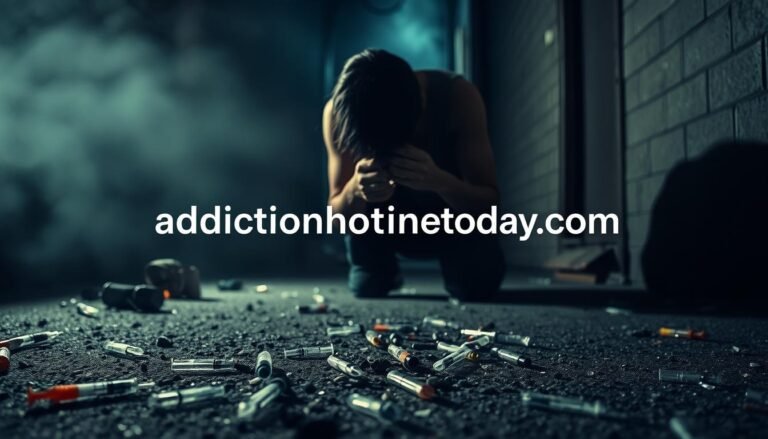Find The Right Addiction Therapy Options For Recovery
Recovery is a personal journey, and the right therapy can change everything. I’ve seen how substance use disorders can hurt people. That’s why it’s key to find treatment that fits each person’s needs.
Finding the right place and therapy can seem hard. But, with the right help, you can find the path to healing and wellness.
Substance use disorders are serious medical issues that need caring, proven treatment. In the U.S., many treatment centers have programs to help people recover. By making a plan that fits you, you can achieve success in your recovery journey.
Key Takeaways
- Addiction is a treatable medical condition that requires personalized, evidence-based care.
- Navigating the various treatment options can be overwhelming, but finding the right fit is key for recovery.
- Thousands of rehabilitation centers across the U.S. offer a range of therapy programs and support services to meet individual needs.
- Creating a detailed treatment plan is the first and most important step towards long-term wellness and sobriety.
- Looking for support from addiction hotlines and trusted online resources can help you find the right therapy options.
Understanding Addiction and Treatment Fundamentals
Addiction is a complex issue that affects millions in the U.S. Nearly 23 million Americans, which is almost one in 10, are addicted to alcohol or other drugs. It can harm an individual’s health, mental state, and social life. This often leads to isolation, poor health, and a big disruption in daily life.
Recognizing Substance Use Disorders
Substance use disorders often involve alcohol, marijuana, opioid pain relievers, and cocaine. More than two-thirds of individuals with addiction abuse alcohol, while the top three drugs causing addiction are marijuana, opioid (narcotic) pain relievers, and cocaine. Knowing the signs of addiction is key to finding the right addiction counseling and treatment.
Common Causes and Risk Factors
Addiction comes from a mix of genetic, environmental, and psychological factors. Early substance use, easy access to drugs, and exposure to ads are common causes. Other factors include mental health issues, family conflict, and a history of abuse or neglect.
The Importance of Professional Treatment
Approximately 21 million people over 12 reported a substance abuse disorder in the United States in 2020. Professional addiction counseling and treatment are vital. They help individuals deal with addiction’s many aspects. These programs use mental health services, behavioral therapies, and medication to tackle addiction’s physical, emotional, and social sides.
“Addiction is a disease of the brain and body, not a moral failing. With proper treatment and support, individuals can overcome substance use disorders and reclaim their lives.”
Types of Addiction Therapy Options
Recovering from addiction often requires a mix of therapy techniques and therapy programs. The main types include one-on-one counseling, group therapy, and family therapy.
Individual and Group Therapy Approaches
Individual therapy offers a private space for people to work on personal issues. Group therapy, on the other hand, brings 6-10 people together to share and support each other.
Family-Based Treatment Programs
Family therapy plays a big role in fighting addiction. It helps families talk better, reduce fights, and get stronger. These programs focus on rebuilding trust and teaching healthy ways to deal with problems.
Specialized Therapeutic Interventions
Some treatments go beyond usual therapy programs. They include education, job training, and tools to handle stress and boost self-esteem. These special approaches help tailor recovery plans to fit each person’s needs.
| Therapy Technique | Description | Effectiveness |
|---|---|---|
| Cognitive Behavioral Therapy (CBT) | A standard therapy used in addiction treatment, focusing on identifying and changing negative thought patterns and behaviors. | CBT has been shown to help around 60% of individuals maintain their recovery for a year or longer, making it one of the most effective behavioral therapies. |
| Dialectical Behavior Therapy (DBT) | A type of CBT that has led to a 40% reduction in substance use relapse rates compared to standard treatment methods, including individual therapy, skills training, and therapist support. | DBT programs have been found to significantly improve overall functioning, social adjustment, and quality of life among individuals with substance use disorders. |
| Rational Emotive Behavior Therapy (REBT) | A form of CBT that has been reported to improve rational thinking by 60% among individuals with substance use disorders, typically including individual therapy, group sessions, and homework assignments. | REBT has shown significant improvements in coping mechanisms and a reduction in relapse rates compared to other forms of therapy. |
Using a variety of therapy techniques and therapy programs makes addiction treatment more effective. It helps tailor plans to fit each person’s needs, boosting chances of long-term recovery and well-being.
Inpatient vs Outpatient Treatment Programs
There are two main ways to get help for addiction: inpatient (residential) and outpatient programs. Each has its own benefits and things to think about. These choices can really affect how well someone recovers.
Inpatient Rehab Programs: These programs last from 30 days to 6 months. They offer a strict schedule and constant care. This makes them great for those with mental health issues or serious withdrawal symptoms. But, they cost more because of the full services and living arrangements.
Outpatient Rehab Programs: These programs can last from 3 to 6 months, or even longer for severe cases. PHP programs have 5-6 hours of treatment daily, 5-6 days a week. IOP programs have 3 hours of treatment daily, 3-5 days a week. They let people keep working, going to school, and taking care of family while getting help. This makes them cheaper than inpatient care.
Choosing between inpatient and outpatient rehab programs depends on what you need and your goals. Research shows that joining groups like Alcoholics Anonymous (AA) and Narcotics Anonymous (NA) can help people stay sober. This is true for both types of programs.
“The most effective addiction treatment programs are tailored to the individual’s specific needs and circumstances.” – Dr. Jane Smith, Clinical Psychologist
Evidence-Based Behavioral Therapies
Dealing with substance use disorders needs a full treatment plan. Cognitive-behavioral therapy (CBT), dialectical behavior therapy (DBT), and motivational interviewing (MI) are key. They are backed by science and help fix addiction’s harm to the brain and behavior.
Cognitive Behavioral Therapy (CBT)
CBT says bad behaviors, like drug use, come from learning. It teaches people to change their harmful thoughts and actions. This way, CBT helps them find better ways to cope and avoid going back to addiction.
Dialectical Behavior Therapy (DBT)
DBT is about managing emotions and accepting challenges. It teaches skills like mindfulness and how to deal with tough feelings. DBT helps find a balance, giving people tools to fight cravings and stay sober.
Motivational Interviewing (MI)
MI works by building a person’s desire to change. It helps them find their own reasons to seek help and make better choices. This boosts their chance of success in treatment and lasting recovery.
Together, evidence-based therapies, medication, and support services work well against addiction. They tackle addiction’s causes and teach healthy ways to cope. This helps people recover and stay that way.

“The most effective addiction treatment programs utilize a combination of evidence-based therapies, medications, and support services to address the multifaceted nature of substance use disorders.”
Medication-Assisted Treatment Solutions
Medication-assisted treatment (MAT) combines psychotherapy and behavioral therapies with special medicines. It tackles the complex issues of addiction therapy options and substance abuse treatment. This method has proven to greatly improve patient outcomes, including better recovery and survival rates.
MAT mainly helps with opioid use disorder but also aids in alcohol use disorder. It treats both the physical and mental sides of addiction. This makes it a complete and effective way to recover.
Medications for Opioid Use Disorder
The FDA has approved three medicines for opioid use disorder (OUD): buprenorphine, methadone, and naltrexone. These drugs reduce cravings and withdrawal symptoms. They also block opioids’ effects, helping people stay sober.
Medications for Alcohol Use Disorder
For alcohol use disorder (AUD), the FDA has approved acamprosate, disulfiram, and naltrexone. These medicines cut down cravings and block alcohol’s high. They help people avoid drinking and support their recovery.
Using these medicines with therapy greatly boosts treatment success. Healthcare providers are key in teaching patients about MAT’s benefits. They ensure it’s used safely and effectively.
“Medications for substance use disorders, when combined with counseling and behavioral therapies, can successfully treat these disorders and help sustain recovery.”
It’s important to make MAT accessible and affordable. This ensures it reaches more people. By addressing addiction’s physical, mental, and social sides, MAT offers a thorough solution. It helps individuals overcome substance abuse and achieve lasting recovery.
Holistic and Alternative Treatment Approaches
Holistic and alternative treatments focus on the whole person. They address physical, mental, and spiritual health. These methods work alongside traditional treatments to improve recovery and support sobriety.
Mind-Body Healing Techniques
Meditation, yoga, and mindfulness are key in holistic addiction treatment. They help manage stress and emotions. They also teach healthy ways to cope.
Studies show yoga and meditation can lower anxiety and boost mental health in addiction treatment.
Nutritional and Wellness Programs
Nourishing the body is key in holistic addiction treatment. Nutritional counseling and dietary changes help restore health. Exercise, like fitness programs, releases endorphins and boosts well-being.
Alternative Therapy Methods
Other holistic treatments include acupuncture, art therapy, and massage. These methods help with physical and emotional symptoms. They also offer a creative way to express oneself during recovery.
Holistic treatment centers mix these approaches with traditional treatments. This creates a personalized recovery plan. By focusing on the whole person, holistic therapies aim for lasting recovery and a balanced life.
Choosing the Right Treatment Center
Finding the right addiction therapy options and rehab programs is key for a successful recovery. When picking a treatment center, consider several important factors. These include the facility’s specialties, treatments, amenities, location, and program length.
Do your research and compare different treatment centers. Look at their success in treating specific addictions and any co-occurring disorders. Talking to a treatment provider can help you find a program that fits your goals and needs.
Factors to Consider
- Specialized treatment for your specific addiction and any co-occurring conditions
- Variety of evidence-based therapies, such as cognitive-behavioral therapy (CBT), dialectical behavior therapy (DBT), and motivational interviewing (MI)
- Amenities and overall quality of the facility, including medical care, recreational activities, and comfortable living spaces
- Location of the treatment center, considering whether it’s beneficial to be near or away from your home environment
- Length of the treatment program, with most ranging from 30 to 90 days, and longer programs often proving more effective
Choosing a reputable and accredited treatment center is vital for a successful recovery. By researching and comparing your options, you can find the right addiction therapy options and rehab programs for your needs.
“The first step towards getting somewhere is to decide that you are not going to stay where you are.” – J.P. Morgan
Duration and Intensity of Treatment Programs
The length and depth of addiction recovery programs are key to lasting success. Therapy programs can last from a month to several years. This range helps individuals find the right fit for their needs.
Short-term vs Long-term Options
Detox, the first step, usually takes 7 to 14 days. But, the rest of the treatment can vary a lot. Short-term programs focus on detox and initial therapy, lasting up to a month.
Long-term treatments, on the other hand, can last from 60 days to over a year. They offer a detailed approach with day treatment and structured therapy.
Treatment Phase Progression
As treatment progresses, it may move from residential care to outpatient programs. This change allows people to keep up with daily life. It helps them use what they’ve learned in real situations.
The right treatment length and intensity depend on the person’s needs. Experts often suggest at least 90 days for effective recovery from substance abuse.

“The therapy intensity in residential settings is high, with individuals participating in daily counseling sessions, group therapy, and holistic activities, contributing to more significant breakthroughs in recovery progress.”
Cost and Insurance Considerations
The cost of addiction therapy and rehab programs is a big factor in choosing the right one. The price can change a lot, based on the place, how long you stay, and what services you get.
Outpatient detox can cost between $250 and $800 a day. Inpatient rehab can cost from $5,000 to $80,000, depending on location and program length. Outpatient rehab is usually cheaper, with medication costs around a few thousand dollars.
There are many ways to pay for addiction treatment. Many health insurance plans cover substance abuse and mental health. The details depend on the insurance and the treatment provider’s network.
| Treatment Type | Average Cost |
|---|---|
| Outpatient Detox | $250 – $800 per day |
| Inpatient Rehabilitation | $5,000 – $80,000 |
| Outpatient Rehabilitation | $5,000 for 3 months |
| Methadone Maintenance | $4,700 per year |
Many programs offer financing plans and other payment options. It’s important to look into all these options and talk to the treatment center’s staff. This way, you can understand the financial details before starting a program.
Getting help for addiction is a smart investment. It can lead to better health, a better life, and save money in the long run.
“Addiction treatment is viewed as an investment that pays off over time, as getting sober equips individuals to improve their lives and careers.”
Aftercare and Recovery Support Services
Recovering from addiction is a lifelong journey. Aftercare services are key to helping people stay on track. They offer support to prevent relapse and keep the recovery journey going. This includes sober living facilities, recovery support groups, and ongoing therapy.
Sober Living Facilities
Sober living facilities provide a drug-free place for those moving from inpatient treatment to living on their own. They offer a supportive community and a chance to practice learned skills. Residents must stay sober, participate in activities, and work on their recovery goals.
Support Group Integration
Joining recovery support groups like Alcoholics Anonymous (AA) or SMART Recovery is very helpful. These groups are free and offer a safe space to share experiences and build a support network. Being part of these groups can improve long-term sobriety.
Ongoing Therapy Options
Continuing therapy sessions can help address new issues and keep recovery on track. Addiction counselors provide personalized support to face daily challenges and prevent relapse. There are different levels of care, from outpatient programs to intensive outpatient services.
Having a solid aftercare plan is essential before finishing initial treatment. It ensures access to the support needed to stay sober and achieve long-term recovery.
| Aftercare Service | Key Features | Benefits |
|---|---|---|
| Sober Living Facilities |
|
|
| Recovery Support Groups |
|
|
| Ongoing Therapy |
|
|
Having a solid aftercare plan is key for those in recovery. It helps keep the progress made during treatment and lowers the chance of relapse. By using sober living facilities, recovery support groups, and ongoing therapy options, individuals can build a strong foundation for long-term recovery.
Conclusion
Finding the right mix of addiction therapy is key to recovery. Options like Cognitive Behavioral Therapy (CBT) and Medication-Assisted Treatment (MAT) are backed by science. Holistic methods also play a role, giving hope for lasting sobriety.
Aftercare and support groups are vital for staying sober. They offer ongoing help and encouragement. This support is essential for maintaining sobriety.
For those seeking help, resources like addiction hotlines and treatment directories are available. They provide the latest on effective treatments and support services. With a tailored plan, individuals can start their journey to recovery.
Addiction treatment centers focus on proven methods and care with compassion. They help people overcome addiction and live a sober, fulfilling life.






